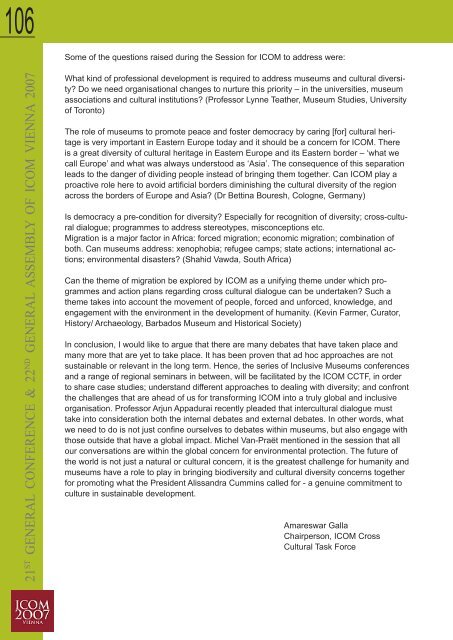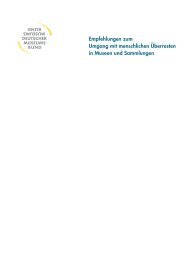general conferenc e & 22 - ICOM Österreich
general conferenc e & 22 - ICOM Österreich
general conferenc e & 22 - ICOM Österreich
Create successful ePaper yourself
Turn your PDF publications into a flip-book with our unique Google optimized e-Paper software.
106<br />
21 st General ConferenCe & <strong>22</strong> nd General assembly of ICom VIenna 2007<br />
some of the questions raised during the session for icom to address were:<br />
What kind of professional development is required to address museums and cultural diversity?<br />
Do we need organisational changes to nurture this priority – in the universities, museum<br />
associations and cultural institutions? (Professor Lynne teather, museum studies, University<br />
of toronto)<br />
the role of museums to promote peace and foster democracy by caring [for] cultural heritage<br />
is very important in eastern europe today and it should be a concern for icom. there<br />
is a great diversity of cultural heritage in eastern europe and its eastern border – ‘what we<br />
call europe’ and what was always understood as ‘asia’. the consequence of this separation<br />
leads to the danger of dividing people instead of bringing them together. can icom play a<br />
proactive role here to avoid artificial borders diminishing the cultural diversity of the region<br />
across the borders of europe and asia? (Dr Bettina Bouresh, cologne, germany)<br />
is democracy a pre-condition for diversity? especially for recognition of diversity; cross-cultural<br />
dialogue; programmes to address stereotypes, misconceptions etc.<br />
migration is a major factor in africa: forced migration; economic migration; combination of<br />
both. can museums address: xenophobia; refugee camps; state actions; international actions;<br />
environmental disasters? (shahid Vawda, south africa)<br />
can the theme of migration be explored by icom as a unifying theme under which programmes<br />
and action plans regarding cross cultural dialogue can be undertaken? such a<br />
theme takes into account the movement of people, forced and unforced, knowledge, and<br />
engagement with the environment in the development of humanity. (Kevin Farmer, curator,<br />
History/ archaeology, Barbados museum and Historical society)<br />
in conclusion, i would like to argue that there are many debates that have taken place and<br />
many more that are yet to take place. it has been proven that ad hoc approaches are not<br />
sustainable or relevant in the long term. Hence, the series of inclusive museums <strong>conferenc</strong>es<br />
and a range of regional seminars in between, will be facilitated by the icom cctF, in order<br />
to share case studies; understand different approaches to dealing with diversity; and confront<br />
the challenges that are ahead of us for transforming icom into a truly global and inclusive<br />
organisation. Professor arjun appadurai recently pleaded that intercultural dialogue must<br />
take into consideration both the internal debates and external debates. in other words, what<br />
we need to do is not just confine ourselves to debates within museums, but also engage with<br />
those outside that have a global impact. michel Van-Praët mentioned in the session that all<br />
our conversations are within the global concern for environmental protection. the future of<br />
the world is not just a natural or cultural concern, it is the greatest challenge for humanity and<br />
museums have a role to play in bringing biodiversity and cultural diversity concerns together<br />
for promoting what the President alissandra cummins called for - a genuine commitment to<br />
culture in sustainable development.<br />
amareswar galla<br />
chairperson, icom cross<br />
cultural task Force




